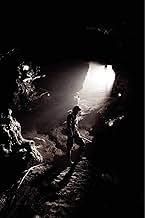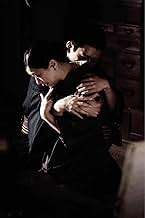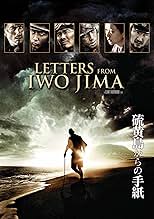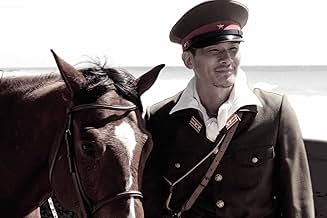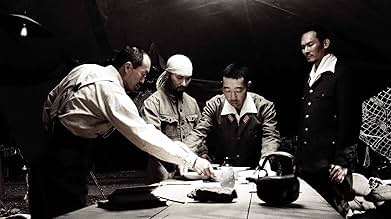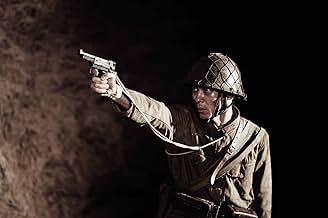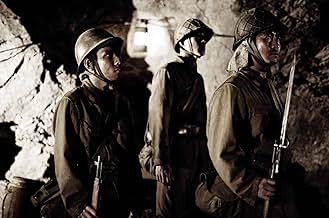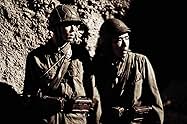La historia de la batalla de Iwo Jima entre los Estados Unidos y el Japón imperial durante la Segunda Guerra Mundial, contada desde la perspectiva de los japoneses que lucharon en ella.La historia de la batalla de Iwo Jima entre los Estados Unidos y el Japón imperial durante la Segunda Guerra Mundial, contada desde la perspectiva de los japoneses que lucharon en ella.La historia de la batalla de Iwo Jima entre los Estados Unidos y el Japón imperial durante la Segunda Guerra Mundial, contada desde la perspectiva de los japoneses que lucharon en ella.
- Dirección
- Guión
- Reparto principal
- Ganó 1 premio Óscar
- 25 premios y 39 nominaciones en total
Shidô Nakamura
- Lieutenant Itô
- (as Shidou Nakamura)
Luke Eberl
- Sam
- (as Lucas Elliot)
Sonny Saito
- Medic Endô
- (as Sonny Seiichi Saito)
Reseñas destacadas
The film concerns about General Kuribayashi(Ken Watanabe)who takes command of the troops on the island of Iwo Jima, he's responsible for the defense of the island from the US army , one of the most difficult campaigns of the Pacific theater. While a young soldier named Saigo(Ninomiya) faces the war horror. When the battle starts , both Kuribayashi and Saigo encounter courage, bravery, and honor.The picture is magnificently directed by Clint Eastwood(Flag of our fathers), and his son Kyle Eastwood realized an atmospheric musical score. Appropriate and colorful cinematography by Tom Stern. Spectacular production design by Henry Bumstead in his last film , he usually worked for Alfred Hitchcock and Clint Eastwood. Splendid screenplay by Paul Haggis(also producer along with Steven Spielberg). Rating : Above average, well worth watching.
Adding more details over the largely described on the movie, the events happened of the following manner: Iwo Jima is a tiny island of volcanic rock and black sand. It has no natural water supply and covers just 8 square miles. Its capture was vital to the US war effort , however. It was one of the inner ring of islands protecting mainland Japan. It also lay almost halfway between the Japanese home island and the Marianas which had been occupied by US forces in mid-1944. The island was defended by 21.000 Japanese. The commander , Major General Kuribayashi had worked hard to add to the natural defenses , especially around Mount Suribachi and in the North. He had built one of the most formidable defensive complexes of the war. It had miles of tunnels and trenches , hundred of underground emplacements, antitank ditches and mini-fields. Kuribayashi knew that the garrison had no hope of any outside help and could not withdraw from the island. He ordered his men to fight and die in their trenches. They should kill as many enemy as possible, using the network of tunnels to get destruction squads, joining a squad meant almost certain death. Kuribayashi chose not to oppose the initial landings on the beaches. He would lure the US troops inland into the web of defensive positions in the interior. The US invasion was code-named operation detachment. When US bombers began attacking was bombed every day in what was the longest and heaviest aerial bombardment of the whole Pacific war. The landings involved 800 warships, manned by a total of 220.000 crew. About 110.000 troops were to take part in the initial assault of follow-on landings. The landings themselves were responsibility of three Marine Divisions under the command of Major General Harry Schmidt. US Marines took cover from Japanese fire on a beach of volcanic sand, March 5,1945 and Mount Suribachi rises behind them. The island was declared secure on March 26, the 36 days of fighting had taken a terrible toll on both sides. Some 5.931 Marines had been killed and 17.372 wounded. There were also about 2.800 naval casualties. The precise number of Japanese dead is not known. Only 216 men surrendered during the fighting, although another 900 or so surrendered later. The rest of the 21.000 troops died. The intensity of the fighting for Iwo Jima worried US commanders and politicians. The Japanese had been willing to die almost to a man to protect a tiny part of their homeland. They had inflicted severe losses on the US forces.
Adding more details over the largely described on the movie, the events happened of the following manner: Iwo Jima is a tiny island of volcanic rock and black sand. It has no natural water supply and covers just 8 square miles. Its capture was vital to the US war effort , however. It was one of the inner ring of islands protecting mainland Japan. It also lay almost halfway between the Japanese home island and the Marianas which had been occupied by US forces in mid-1944. The island was defended by 21.000 Japanese. The commander , Major General Kuribayashi had worked hard to add to the natural defenses , especially around Mount Suribachi and in the North. He had built one of the most formidable defensive complexes of the war. It had miles of tunnels and trenches , hundred of underground emplacements, antitank ditches and mini-fields. Kuribayashi knew that the garrison had no hope of any outside help and could not withdraw from the island. He ordered his men to fight and die in their trenches. They should kill as many enemy as possible, using the network of tunnels to get destruction squads, joining a squad meant almost certain death. Kuribayashi chose not to oppose the initial landings on the beaches. He would lure the US troops inland into the web of defensive positions in the interior. The US invasion was code-named operation detachment. When US bombers began attacking was bombed every day in what was the longest and heaviest aerial bombardment of the whole Pacific war. The landings involved 800 warships, manned by a total of 220.000 crew. About 110.000 troops were to take part in the initial assault of follow-on landings. The landings themselves were responsibility of three Marine Divisions under the command of Major General Harry Schmidt. US Marines took cover from Japanese fire on a beach of volcanic sand, March 5,1945 and Mount Suribachi rises behind them. The island was declared secure on March 26, the 36 days of fighting had taken a terrible toll on both sides. Some 5.931 Marines had been killed and 17.372 wounded. There were also about 2.800 naval casualties. The precise number of Japanese dead is not known. Only 216 men surrendered during the fighting, although another 900 or so surrendered later. The rest of the 21.000 troops died. The intensity of the fighting for Iwo Jima worried US commanders and politicians. The Japanese had been willing to die almost to a man to protect a tiny part of their homeland. They had inflicted severe losses on the US forces.
10sford-20
I was very disappointed to learn that this movie was only going to have a limited showing in the US, only one or two theaters on either coast. My wife and I both enjoyed "Flags" and were pleased when we learned that Clint Eastwood made a second movie, this time telling the story from the Japanese perspective. As luck would have it, we going to Japan for the holidays so we decided to try and see the movie in Tokyo during our trip. We went to the Ginza area of Tokyo and, to our surprise, the movie was completely sold out. We needed to buy tickets at least one day in advance. Further, we learned that the movie was currently number 1 in Japan. Wow that's impressive that an American made movie would become number one in Japan! Way to go, Clint! After a little extra planning and some adjustments to our schedule, we bought advance tickets and came back the next day.
We completely loved it. We were moved and stirred with many emotions including anger, anger over the horrors of war. We actually liked it better than "Flags of our Fathers". The movie was in Japanese and, as near as we could tell, Japanese appears to be the native language of the film. There were brief moments of English, American solders talking, one flash back scene before the war during a foreign dignitary dinner, and of course the credits at the end. The movie would have to be translated and/or sub titled to English in order to have half a chance in the US. Frankly, I think translation would take away from the movie's beauty and meaning. I understand a limited amount of Japanese so I could follow most of the story. The theater was very big and packed. I was a little uncomfortable at first; I may well have been the only American in the place. My wife (who is Japanese) and I sat next to an older couple. At several points during the film, I thought I noticed the man from the couple crying. When the film ended, my wife talked with the couple and learned that the old man's father died in Iwo jima. Later during the trip, speaking with Japanese friends and seeing the Japanese news, stories of lost loved ones from the war were common and this movie for the Japanese people has brought many of these memories out in the open.
To the Japanese, Iwo jima was a part of their homeland where a foreign invader was going to land and begin its invasion on Japanese soil. Throughout all of recorded Japanese history, never had a foreign invader prevailed in war against the Japanese on Japanese land. The imperial Japanese government of that time used this when they sent fighters to Iwo jima. These fighters were to ordered to "fight to the death" defending their country. That to loose and not die fighting would bring disgrace to self and family. They knew that America was planning to send an overwhelming force and they knew that they were being sent to die. For Americans, Iwo jima was just another far away place and different point in time where American boys were sent and where, unfortunately, some lives were lost fighting for freedom. My god, have we become that blasé about the wars our sons and daughters are being sent to fight in? My wife and I are unique, not typical American movie goers. I'm American, my wife is Japanese. Together, we've visited and cried together at the A-bomb Dome in Hiroshima, and again at the Arizona Memorial in Hawaii. I have relatives who fought in the Pacific, she also has family who fought in the war and who lived in Hroshima. I have two sons now serving in the US Marines. Together my wife and I watched and enjoyed both movies. The movies really didn't bring anything new, historically, to us about Iwo jima. But, the movies did do an excellent job reminding us that the ones who pay the price for war are normal everyday people. People who really don't understand the reasons or the politics behind why they are being sent to die. People who live, love, and are loved by family and friends. People with dreams and ambitions. But, for some reason when called by the leaders of the time, they go forward, obey orders, and do their duty. Sometimes, paying the ultimate price.
I've grown up with Clint Eastwood and it has been a wonderful entertaining journey. These two movies are, in my opinion, his best. Not because of the action, or the drama, or any of the other things that Clint Eastwood is known for, but because he's given us two interlinked stories about the affects of war on the people who are called to pay the ultimate price people like you and me. We may be from different cultures, eat different food, speak different languages, prey to God differently, but we all have things in common. We all live, love, want to be loved, and we dream about and long for peace. And, sometimes we are called to serve and pay for the opportunity. Thank you Clint.
We completely loved it. We were moved and stirred with many emotions including anger, anger over the horrors of war. We actually liked it better than "Flags of our Fathers". The movie was in Japanese and, as near as we could tell, Japanese appears to be the native language of the film. There were brief moments of English, American solders talking, one flash back scene before the war during a foreign dignitary dinner, and of course the credits at the end. The movie would have to be translated and/or sub titled to English in order to have half a chance in the US. Frankly, I think translation would take away from the movie's beauty and meaning. I understand a limited amount of Japanese so I could follow most of the story. The theater was very big and packed. I was a little uncomfortable at first; I may well have been the only American in the place. My wife (who is Japanese) and I sat next to an older couple. At several points during the film, I thought I noticed the man from the couple crying. When the film ended, my wife talked with the couple and learned that the old man's father died in Iwo jima. Later during the trip, speaking with Japanese friends and seeing the Japanese news, stories of lost loved ones from the war were common and this movie for the Japanese people has brought many of these memories out in the open.
To the Japanese, Iwo jima was a part of their homeland where a foreign invader was going to land and begin its invasion on Japanese soil. Throughout all of recorded Japanese history, never had a foreign invader prevailed in war against the Japanese on Japanese land. The imperial Japanese government of that time used this when they sent fighters to Iwo jima. These fighters were to ordered to "fight to the death" defending their country. That to loose and not die fighting would bring disgrace to self and family. They knew that America was planning to send an overwhelming force and they knew that they were being sent to die. For Americans, Iwo jima was just another far away place and different point in time where American boys were sent and where, unfortunately, some lives were lost fighting for freedom. My god, have we become that blasé about the wars our sons and daughters are being sent to fight in? My wife and I are unique, not typical American movie goers. I'm American, my wife is Japanese. Together, we've visited and cried together at the A-bomb Dome in Hiroshima, and again at the Arizona Memorial in Hawaii. I have relatives who fought in the Pacific, she also has family who fought in the war and who lived in Hroshima. I have two sons now serving in the US Marines. Together my wife and I watched and enjoyed both movies. The movies really didn't bring anything new, historically, to us about Iwo jima. But, the movies did do an excellent job reminding us that the ones who pay the price for war are normal everyday people. People who really don't understand the reasons or the politics behind why they are being sent to die. People who live, love, and are loved by family and friends. People with dreams and ambitions. But, for some reason when called by the leaders of the time, they go forward, obey orders, and do their duty. Sometimes, paying the ultimate price.
I've grown up with Clint Eastwood and it has been a wonderful entertaining journey. These two movies are, in my opinion, his best. Not because of the action, or the drama, or any of the other things that Clint Eastwood is known for, but because he's given us two interlinked stories about the affects of war on the people who are called to pay the ultimate price people like you and me. We may be from different cultures, eat different food, speak different languages, prey to God differently, but we all have things in common. We all live, love, want to be loved, and we dream about and long for peace. And, sometimes we are called to serve and pay for the opportunity. Thank you Clint.
Not having seen Flags of Our Fathers, I'll be unable to make any comparison to its companion-movie. Even on its own Letter to Iwo Jima could be seen as representing the new tendency to "humanise" what were until recently the traditional WW2 villains from an Anglosaxon point of view. History tends to be written by those on the winning side - hence, we have had decades of inhuman German war machines, cowardly Italians and unspeakably cruel Japanese. Now, over 60 years since WW2, it has become acceptable - nay, the done thing if you have a conscience, to humanise the losers and show even the winners as fallible and even individually despicable (***SPOILER:*** see the American soldier who shoots the two Japanese prisoners who've deliberately given themselves over. ***END OF SPOILER***). Letters to Iwo Jima clearly has its heart in the right place: it wants to be objective, above and beyond anything else. And it is. Japanese soldiers have mothers, adorable young pregnant wives in pretty kimonos and sons they write loving letters to. We empathise with them no less than we have with all those American soldiers in an endless string of war movies. Technically, Letters is a well-made movie. It's also genuinely moving in parts - you do end up caring for most of the main players. For my personal taste, though, it spells things out too much and too often. Still, for something produced by Mr Manipulative Spielberg and co-written by Paul "Crash" Haggis, I was impressed.
I had previously watched the violent battle of Iwo Jima in two good movies: 1949 "Sands of Iwo Jima" and more recently in "Flags of Our Fathers". In both features, we see very well-choreographed battle scenes disclosed from the North American point of view, with the "heroism" of the American troops and the personal drama of a couple of soldiers and families, in the usual unilateral formula to reach great box offices in USA. Further, in these two movies, the enemy is nothing but evil and threatening one dimension shadows, using weapons to kill the brave marines.
However, "Letters from Iwo Jima" gives a totally different approach of war, unusual in Hollywood: it shows the human side of the enemies. In this film, the Japanese are also human beings, with different culture where they are prepared to die with honor, but people that love and are loved by someone, have families, wives and children, and fear and suffer with the insanities of war. In this aspect, I liked very much the pacifist perspective given by Clint Eastwood for the same battle, opening the eyes and hearts of viewers that probably were not able to understand this side of the Japanese (and other people) in a war. My vote is eight.
Title (Brazil): "Cartas de Iwo Jima" ("Letters From Iwo Jima")
However, "Letters from Iwo Jima" gives a totally different approach of war, unusual in Hollywood: it shows the human side of the enemies. In this film, the Japanese are also human beings, with different culture where they are prepared to die with honor, but people that love and are loved by someone, have families, wives and children, and fear and suffer with the insanities of war. In this aspect, I liked very much the pacifist perspective given by Clint Eastwood for the same battle, opening the eyes and hearts of viewers that probably were not able to understand this side of the Japanese (and other people) in a war. My vote is eight.
Title (Brazil): "Cartas de Iwo Jima" ("Letters From Iwo Jima")
The companion film to "Flags of Our Fathers" shows the battle of Iwo Jima from the Japanese point of view. Starting with the building of fortifications, hiding from relentless bombardment, and fending off an equally strong attack as American troops land on the island.
"Letters from Iwo Jima" just like "Flags of Our Fathers" is a first rate war movie with a relevant message with its critical nature. "Flags" showed the selling of war and "Letters" does the same, albeit with a different mind-set. Japan was an empire governed by a monarch back then so the military mentality was quite different, but it is also important to note the similarities. Especially at the base of the social pyramid where it is quite apparent that people are people no matter where you go.
Virtually all of the uber-patriotic tendencies that were rampant in Imperial Japan during WWII were also in Nazi Germany and, as both "Flags" and "Letters" demonstrate in the United States as well. People were used for the purpose of the government and were fed propaganda just the same. Maybe a different in a different form, but in the end it is all the same.
Ken Wantanbe is the film's highlight as a military man torn between his sense of duty and his inner feelings. As commander of the island he sees amongst his men the fanaticism, the pacifism, the "just do our job" crowd, and many other configurations of thought in between and mixed with the others. Even strange that some men initially want to fight and are proud to serve in the military and what's shocking is that some of their wives and mothers believe the same.
That paints a landscape of war as something amidst all of the stereotypes that have been made of it. Since that is where the truth usually lies, amidst all the gray matter. --- 9/10
Rated R: war violence/carnage
"Letters from Iwo Jima" just like "Flags of Our Fathers" is a first rate war movie with a relevant message with its critical nature. "Flags" showed the selling of war and "Letters" does the same, albeit with a different mind-set. Japan was an empire governed by a monarch back then so the military mentality was quite different, but it is also important to note the similarities. Especially at the base of the social pyramid where it is quite apparent that people are people no matter where you go.
Virtually all of the uber-patriotic tendencies that were rampant in Imperial Japan during WWII were also in Nazi Germany and, as both "Flags" and "Letters" demonstrate in the United States as well. People were used for the purpose of the government and were fed propaganda just the same. Maybe a different in a different form, but in the end it is all the same.
Ken Wantanbe is the film's highlight as a military man torn between his sense of duty and his inner feelings. As commander of the island he sees amongst his men the fanaticism, the pacifism, the "just do our job" crowd, and many other configurations of thought in between and mixed with the others. Even strange that some men initially want to fight and are proud to serve in the military and what's shocking is that some of their wives and mothers believe the same.
That paints a landscape of war as something amidst all of the stereotypes that have been made of it. Since that is where the truth usually lies, amidst all the gray matter. --- 9/10
Rated R: war violence/carnage
¿Sabías que...?
- CuriosidadesShot back-to-back with Banderas de nuestros padres (2006).
- PifiasWhen the soldiers in the cave commit suicide they use what look like type 97 hand fragmentation grenades held close to their chests.
The point of most grenades is to send out numerous fragments as fast-flying projectiles killing those close by (a few yards) or seriously injuring those further away.
However, even though the soldiers are all standing a few feet apart, as each grenade explodes only the person holding it is affected.
- Citas
General Tadamichi Kuribayashi: If our children can live safely for one more day it would be worth the one more day that we defend this island.
- Banda sonoraString Quartet No.6, Op. 1-6, Hob. III-6, Mov.2
Composed by Joseph Haydn
At a party where Ken Watanabe participated
Selecciones populares
Inicia sesión para calificar y añadir a tu lista para recibir recomendaciones personalizadas
- How long is Letters from Iwo Jima?Con tecnología de Alexa
- What is "Letters from Iwo Jima" about?
- Is "Letters from Iwo Jima" based on a book?
- Is seeing "Flags of Our Fathers" important for understanding this movie?
Detalles
- Fecha de lanzamiento
- País de origen
- Sitios oficiales
- Idiomas
- Títulos en diferentes países
- Cartes des d'Iwo Jima
- Localizaciones del rodaje
- Empresas productoras
- Ver más compañías en los créditos en IMDbPro
Taquilla
- Presupuesto
- 19.000.000 US$ (estimación)
- Recaudación en Estados Unidos y Canadá
- 13.756.082 US$
- Fin de semana de estreno en EE. UU. y Canadá
- 89.097 US$
- 24 dic 2006
- Recaudación en todo el mundo
- 68.673.228 US$
- Duración2 horas 21 minutos
- Color
- Mezcla de sonido
- Relación de aspecto
- 2.39 : 1
Contribuir a esta página
Sugerir un cambio o añadir el contenido que falta







